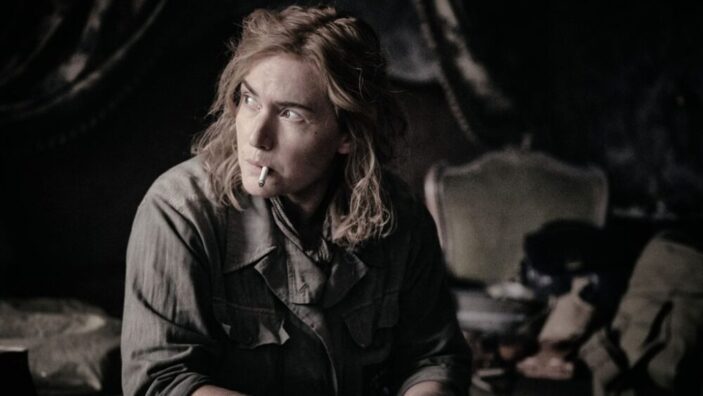
Lee Miller is the type of figure that feels as if she should’ve already had a biopic made about her, due to her staggering spirit and defiance in the face of what was expected of her. Lee is ultimately the only film that Miller deserves, with director Ellen Kuras, a cinematographer making her directorial debut, star Kate Winslet, and the documented works of Miller’s son, Antony Penrose, combining to tell of a woman of conviction in a fascinating portrait.
When the film opens, Lee (Winslet, effortlessly in career-best mode) is in a far more care-free state than what the majority of the film subjects us to, swanning about the European beachside with her equally fabulous friends (Marion Cotillard and Noémie Merlant), living a glamorous life off her brief career as a model for Vogue. Even without the addition of Winslet’s voiceover, we sense that there’s a fleetingness to this idyllic life, and though this period of her life introduced her to her future husband, Roland Penrose (Alexander Skarsgård), sitting idly by to let the world take course was never a mentality Lee would adhere to.
Taking her prowess with a camera and tenacity to bring more to this world than what she was in front of the camera, Lee used her connection with Vogue and its British editor, Audrey Withers (Andrea Riseborough), to storm the front lines of her war-torn country. Whilst she’s occasionally sidelined due solely to her gender, Lee ultimately sets herself in some of the most dangerous, note-worthy moments of history, with the film wisely utilising some of her most iconic photographs as a means to advance the narrative; the brazenness of when she and Times Magazine’s David Scherman (Andy Samberg, a real surprise) were in Hitler’s then-abandoned apartment and snapped a defiant photo in his bathtub perhaps the most infamous.
Given the atrocities she was witnessing around her, it only makes sense that Lee would delve as deep as she could to show the outside world that they can’t turn away from. She was never interested in surface level snapshots, and it’s why she expresses equal passion and almost distain for Audrey when she realises that Vogue are against publishing the real photos of what’s taking place in the world; this scene arguably the most heartbreaking as she storms into the head office and starts destroying the negatives in an act of defiance and rage.
Outside of the fierce nature of her story, Lee allows us minor moments to catch our breath as we see her as a more elderly figure recounting her story to a young journalist (Josh O’Connor), interviewing her for a profile piece. There’s a tenderness to these moments, and it proves a viable way to further exposition without beating us over the head. A certain narrative reveal here additionally adds to the film’s overall emotionality, and whilst these scenes occasionally break the main story’s compelling momentum, it all comes together in a stirring notion that feels like the most fitting send off.
The love and admiration that Winslet has for Lee Miller is evident in every frame, and dedicating the film more to her years as a war correspondent over her career as a model speaks to such. Traditional lifelong-spanned biopic be damned, Lee tells the most formative, important years of its subject’s life without disregarding her prior efforts, with Winslet, once again, reminding us as to why she’s truly one of the greatest actors of her generation.
![]()
![]()
![]()
![]()
![]()
FOUR STARS (OUT OF FIVE)
Lee is now screening in Australian theatres.
